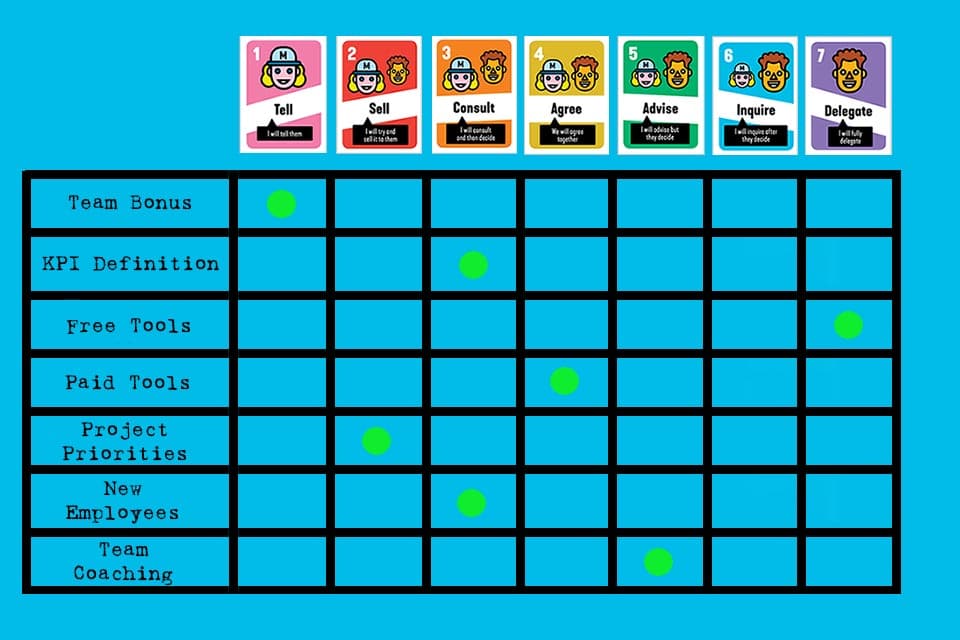Scrum is about team self-management. In order to progressively and clearly share management practices between a manager and his team, we propose to use the Delegation Poker.
This Fun activity will help you prove to your class participants the importance of planning and delegating tasks in being able to properly manage time. This fun competitive activity will sure get everyone energized and motivated. The Management 3.0 rules of delegation poker state, that the manager has the final say on what delegation level to choose. I didn't like this rule, because we would start a new practice exercising old beliefs while trying to establish agile management thinking.
The Delegation Poker is a card game that is promoted by Management 3.0 practices. The objective is to foster discussions about different management matters and how they should be handled in the team .
Delegation Poker – The Recipe
- Step 1: Brainstorming and listing on the different topics of 'What is Team Management ?'
- Step 2: On each topic, the manager and the team play the delegation poker game with the dedicated cards
- Step 3: After discussion, they assign a score from 1-7 to each topic for further reference
During Step 2, each team member, and the manager, indicate for each topic the value he would choose (everyone presents his card at the same time). The values are the following:
1- Tell – I will tell them
2 – Sell – I will try and sell it to them
3 – Consult – I will consult and then decide
4 – Agree – We will agree together
5 – Advise – I will advise but they decide
6 – Inquire – I will inquire after they decide
7 – Delegation – I will fully delegate
where:
I = manager
we = team
The manager and the team discuss the results, and if needed they play multiple rounds until they agree on a decision.
Why are we doing this again?
This practice helps clarify certain aspects, like for example who decides on the holidays. Is the manager having the final say in this ? Why does he want this ? Is he ready to let this decision to the team ?
The value of this practice often lies in the discussion behind the vote. The discussions raise concerns from both the manager and the team which ultimately help both to better understand each other. This practice also shows where there is room for the team to take more initiative and responsibilities.
Make it visible !
At the end of the delegation poker, the teams creates its delegation board with a summary of all the decisions taken. The format doesn't matter (paper version on a wall or in a wiki) but the content serve as reference for future management practices.
Lessons Learned
It is important to manage the delegation board as a living tool.
Make sure when doing the delegation poker that the team knows that the decisions aren't engraved in stone. If circumstances evolve, anyone has the possibility to trigger a new delegation poker to adapt to the new situation.
As a leader, you should always be on the lookout for candidates who would make good team leaders or managers one day.
These are individuals who are confident, intelligent, and able to communicate well with others.
Managers should help their staff grow in their positions, and one vital skill to master to climb up the corporate ladder is delegation.
Some people innately possess the skills needed to delegate, while others must learn them.
A good manager can help these employees learn delegation skills, often without them even knowing about it, with these fun games and activities.

Scavenger Hunt
Pick one or more candidates that you would like to teach delegation skills to, and ask them to help you put on a scavenger hunt for the rest of the employees.
You should assign them all the steps of the preparation, such as picking teams, preparing materials for the hunt, explaining the directions to the participants, and picking rewards for winners.
These are all duties that managers have to continuously conduct in the workplace.
Assigning particular tasks to groups of staff depending on their strengths and weaknesses; preparing tasks and projects to delegate; providing instructions as to how to complete the tasks and projects; and rewarding staff for good work.
Depending on how well your candidates do on this task will give you insight about how they might fare as future leaders one day.
Legos
This is an easy activity that doesn't require a lot of time or setup.
Create a shape out of Legos, not making it too difficult or too easy to replicate.
Depending on the size of your team, allow staff to participate as individuals or groups, giving each team the Lego pieces required to replicate the model.
Pick a person that you would like to improve their delegation skills to be the leader.
Provide this model to the leader, and ask him to stand in front of the others with their back to them, hiding the Lego piece.
The goal of this exercise is for the leader to explain to others how to replicate the model.
This activity helps those learning to delegate communicate via precise and clear language, as well as use a step-by-step approach to help others understand what is required, which is imperative for all leaders.
Although the concept of learning any new skill does not sound fun, creating games or fun activities that teach delegation skills can be an enjoyable, yet useful process.
Delegation Poker Scenarios Against
Many thanks
Delegation Poker Scenarios Games
Mark Williams
Head of Training and Development
Delegation Poker Scenarios Game
(Image from Dollarphotoclub)

